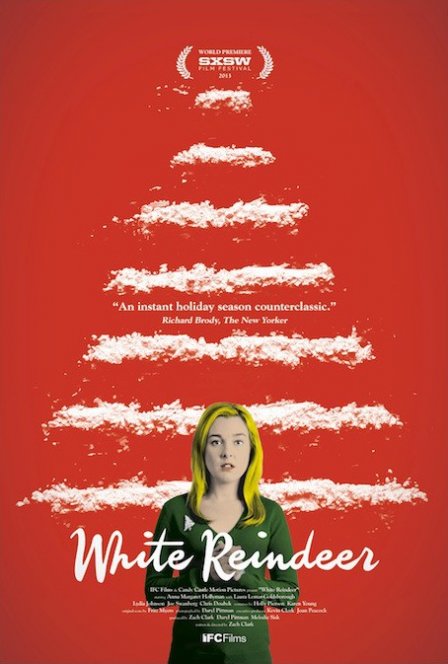“Acting as if” is a neat psychological trick in which you behave in the way you wish to be perceived. The idea is that if you put on the performance enough, eventually you won’t be playing the part but have internalized and now sincerely living it. Act like a confident person, and you’ll soon find yourself adopting that confidence. It’s similar to the effect of smiling to deceive your mind into thinking you’re happy: your brain registers you’re smiling, it recognizes that you smile when you’re happy, and so neurochemicals are released to make this a reality. “Acting as if” is a matter of dressing up the external trappings in hopes your internal world catches up. This can be most true around the holidays as we are expected to be full of good Christmas cheer. But sometimes, as in Zach Clark’s White Reindeer, no matter how much we wrap ourselves in tinsel or how many cartons of eggnog we chug, it’s hard to forget about our husband’s brains splattered on the living room floor.
Anna Margaret Hollyman plays Suzanne, whose yuletide cheer has been seriously dampened by her husband Jeff’s sudden and gruesome murder three weeks before Christmas, leaving behind a devastating loss and sordid browser history. As the big day approaches, Suzanne finds her advent calendar filled not with yummy confections but unfortunate revelations of her husband’s penchant for “nasty chocolate teens,” in particular a local stripper named Autumn (Laura Lemar-Goldsborough). Suzanne replaces the Kubler-Ross 5 Stages of Grief (Denial, Anger, Bargaining, Depression, Acceptance) with her own impromptu stages of Blow, Booze, Shoplifting, Orgies, and Online Shopping with various degrees of success. Throughout her descent into distraction and self-destruction, Suzanne still clings to the reason for the season and hopes that the magic of many a Christmas movie will occur and she’ll feel happy again.
White Reindeer is one of the most rewarding mash-ups of holiday cheer and dark impulses since Bobby “Boris” Pickett’s Monster’s Holiday. At first the film seems to be veering into a caricature of dark comedy by heaping on the horrific reactions of Suzanne’s self-absorbed coworkers and her parents’ sudden divorce. Luckily, it rights itself and settles into a funny, touching examination of loss and that need we all have to believe something we know isn’t true. Suzanne didn’t know her husband as well as she thought, but it’s still hard for her to give up the ghost of the happiness she had before finding out about Jeff’s surprising (and surprisingly intimate) affair with Autumn. Just like most people put away their belief in Santa yet still find themselves infected with all of the candy canes, music, and pretty lights on the tree, Suzanne finds that even though her marriage was more flawed than she thought, there’s still comfort and joy to be found in what she once had. She also finds out that she also may not be who she thought she was, lining her purse with aluminum foil to steal merch from Macy’s or doing rails with her new stripper friends.
It’s a common misconception that suicides peak during the holidays (it’s actually during spring) — but it makes sense why it feels like it’s true to us. Christmas (I could add Hanukkah and Kwanzaa, but c’mon: Phil Spector didn’t produce a Hanukkah album) is surrounded by messages of love, giving, joy; anything falling outside of that is seen as that much worse for happening at what should be a celebration of all that is Good. But the fact is the holidays suck for many people, and unfortunate events don’t take a vacation until the new year. White Reindeer’s writer/director Zach Clark looks at someone who believes not in the fairy tale of Christmas but in the possibility of good tidings of great joy. He’s examining what happens when that belief is irrevocably shattered, when Christmas has passed without any miracles in sight, and what solace can still be found with others and what strength lies within ourselves. Downward spirals don’t occur when it’s convenient, or when there aren’t constant reminders of how we’re “supposed” to feel. But when you hit the bottom, you might be surprised at what you find. As White Reindeer shows, “Acting as if” is self-delusion, especially when we’re already the people we’re hoping to become.

